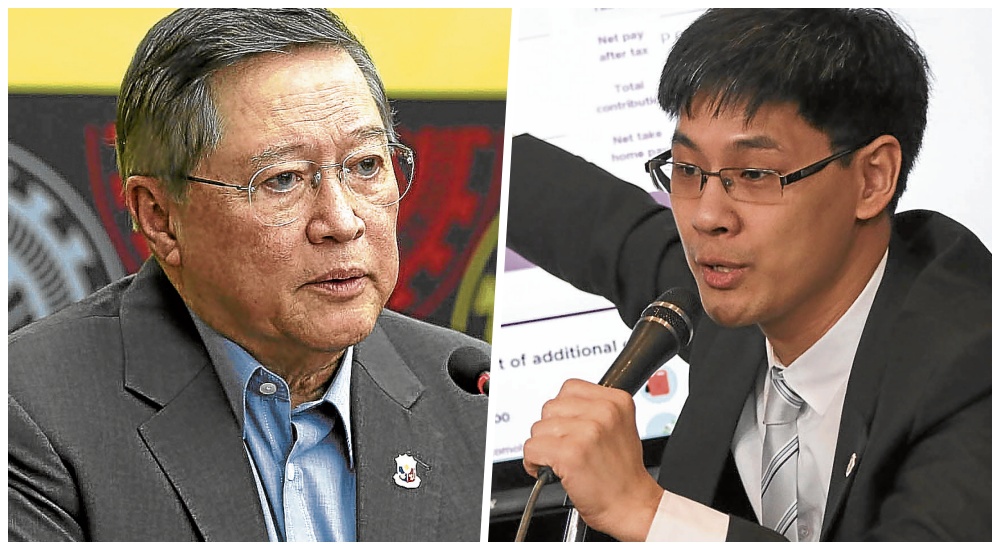Duterte economic team concedes ‘a step backwards’ to possible lockdown amid Delta variant threat

FILE PHOTO: President Rodrigo Duterte’s chief economic manager, Finance Secretary Carlos Dominguez III (left) and Socioeconomic Planning Secretary Karl Kendrick Chua (right) INQUIRER FILES
MANILA, Philippines — President Rodrigo Duterte’s economic team has conceded to a possible revert to more stringent lockdown, as proposed by some business groups, to prevent the further spread of the more contagious Delta variant of COVID-19.
“Sometime last year, I made the observation that this contagion would most likely not disappear quickly and that sometimes we may have to take a step backwards after taking two [steps] forward, to protect our gains achieved in combating the virus. I believe the new variant has forced us to do exactly that,” Finance Secretary Carlos Dominguez III – Duterte’s chief economic manager – said Wednesday when sought to comment on business chambers’ proposal for a “hard” lockdown next month.
“I cannot predict the future with any accuracy, but we can prepare ourselves for any eventuality by protecting our financial capacity to react appropriately to developments,” Dominguez said.
Socioeconomic Planning Secretary Karl Kendrick Chua, for his part, acknowledged “higher” risks from the Delta strain, whose spread jacked-up infections and forced lockdowns in neighboring countries.
Chua, who heads the state planning agency National Economic and Development Authority (Neda), said risk management will be key, similar to the experience from end-March to mid-April when National Capital Region (NCR) Plus – Metro Manila and four surrounding provinces accounting for half of the economy – reverted to the most stringent enhanced community quarantine (ECQ) while still allowing essential businesses to operate and employees to go to work.
“Our response is to manage the risks by ensuring a much faster vaccination rate, and limiting more stringent lockdowns in local areas or sectors of highest risk, while allowing the rest of the people, especially those already vaccinated, to earn a living. Our experience last March to April, where we were able to do a better balance, can guide our response,” Chua said.
In an email last Tuesday, International Monetary Fund (IMF) resident representative for the Philippines Yongzheng Yang said “the Delta variant of the coronavirus is a concern and we are monitoring its potential impact on the economy.”
While the IMF’s World Economic Outlook (WEO) Update kept the gross domestic product (GDP) growth forecast for the Philippines at 5.4 percent – below the government’s downscaled 6-7 percent target range, Yang said the “timely implementation of fiscal support – with flexibility to address evolving priorities — is crucial for continued recovery.”
“The fiscal deficit targeted in the 2021 budget provides significant stimulus to economic activity, but given the imperative to beat the virus and the continued difficulties faced by vulnerable families and businesses, more resources could be needed. Such resources should aim to bolster the healthcare system to accelerate vaccinations, strengthen capacity for testing, tracing, isolation, and treatment, and support affected families and businesses. A medium‑term fiscal strategy should underpin the eventual rebuilding of fiscal space,” Yang said, citing the IMF’s recommended policy responses at the end of its Article IV consultation mission last month.
The economic team wanted to keep the budget deficit for 2021 within a record-high 9.3 percent of GDP or P1.86 trillion, with P4.74 trillion in expenditures set aside this year mainly to fight the health and socioeconomic crises inflicted by the prolonged pandemic.
But the government reported last Tuesday that it underspent during the first half, as actual disbursements for public goods and services amounted to P2.21 trillion, 9.6-percent lower than the P2.44-trillion program, at a time when stimulus spending would have supported economic recovery from last year’s worst post-war recession wrought by COVID-19.
The Cabinet-level Development Budget Coordination Committee (DBCC) last week kept the yearly economic growth targets up to 2024 “amid the declining number of COVID-19 cases in the country since the peak in April, and the gradual reopening of the economy with more targeted granular lockdowns.” It will again review its near- to medium-term growth targets after the government reports on the second-quarter GDP performance on August 10.
For more news about the novel coronavirus click here.
What you need to know about Coronavirus.
For more information on COVID-19, call the DOH Hotline: (02) 86517800 local 1149/1150.
The Inquirer Foundation supports our healthcare frontliners and is still accepting cash donations to be deposited at Banco de Oro (BDO) current account #007960018860 or donate through PayMaya using this link.
